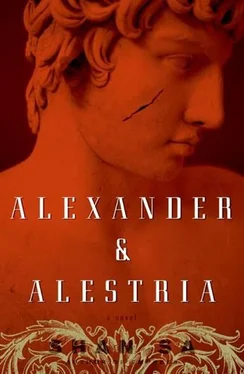Hephaestion came to greet me, telling me Cassander was angered by these frescoes to Darius's glory, and wanted to replace them with scenes of Alexander's battles. I cast my eyes over Dar-ius's chests of different perfumes, his musical instruments, his carpets of spun gold… and I started to laugh.
I, Alexander, son of Olympias, whore of Philip, usurper of the League of Corinth, had become master of Babylon. It was a miracle I could barely believe.
The scars on my body counted out the battles won with force and fury. The calluses on my hands told of enemies defeated and lands conquered. Nothing else about me or on me proved that I was master of Macedonia, Greece, Egypt, Arabia, and Persia. I felt as if I had cheated: that was why I laughed. Since the dawn of time the earthly crown had been waiting for just one master. All those who longed for it had failed. I had grasped it, but not because I had greater strength, better tactics, or more determination. I, Alexander of Macedonia, was not afraid of the stars of decadence. Where other men retreated, I advanced. Where other men gave up, I persevered.
***
Hephaestion, my friend, why do Darius's courtiers speak Greek when none of our generals speak Persian?
Why do Cassander, Perdiccas, and Crateros insist on wearing worn old sandals when Darius's slaves wear embroidered shoes?
Why did the West close its doors on the East, claiming it was barbarian?
I, Alexander, shall wear oriental dress and learn the language of the defeated. I want the East and the West to unite, the luxuries of Persia to combine with our philosophy, the strength of Macedonia to flourish in the beauty of oriental art. I want our bloods to mix. I shall send Persian women to the Greek islands so their children can benefit from two languages and a double inheritance. I shall drive away the bandits who prowl the trading routes and put the corrupt Persian army back on a sound footing.
Tradesmen will no longer be subject to extortion: from now on our soldiers will protect their caravans. Alexander will open up the free market between East and West.
Hephaestion, do you understand what the forced marches were for, wearing down soldiers' feet and torturing their legs? Do you understand why horses died and soldiers starved and the incandescent sun blinded us and drove men mad? Do you understand the reason for the murders, executions, and massacres? A far greater good can emerge from evil!
Without violence there would be no exchange. Without the war led by Alexander, all these peoples-the Greeks, the Macedonians, the Persians, the Chaldeans, the Jews, the Egyptians, and the Arabs-would never have agreed to embrace each other.
Don't you see, it is here, in Babylon, in Darius's bed, that my fate has been revealed. I have conquered peoples, and those peoples have conquered me. For them I shall design a new civilization, a new world, that of the phoenix rising from the ashes.
The eunuch who has already betrayed one master must die of a sudden fever. I shall confer the regency of Babylon on Mazee, Darius's general who fought valiantly against Alexander.
Crateros shall be the arm mercilessly brandishing my sword. One by one, Darius's sons-both legitimate and illegitimate- shall be tracked down and decapitated. You, Hephaestion, who love medicine, you must learn Persian remedies and magic. You shall heal my wounds and give succor to my soul.
***
The door of the imperial gynaeceum opened to reveal thousands of women's bodies, offerings given by the empire's twenty satrapies. Princesses, noblewomen, daughters of the common people, daughters of vassal tribes, girls captured by nomadic cavalries… all had been Darius's slaves, captive to his desires.
Young, old, barely out of childhood, blond, brunette, white, black, women from every land on earth were represented here, living imprisoned in a vast room covered in carpets and decorated with pools and fountains. They slept, urinated, danced, embraced, sang, and ate in a hubbub of moans, cries, sighs, and laughter, all indifferent to onlookers or to the smell of putrefaction and excrement. Eunuchs circulated among them, some serving, others cracking a whip. I was informed that since Darius fled, the attendants in the City of Pleasure had stopped cleaning the gynaeceum and only fed the women once a day. Their eyes looked dull and empty for lack of air and freedom, like birds with clipped wings no longer dreaming of the sky. In all that dying flesh I found the king's favorite, the one painted on all the walls of his bedchamber. She was lying naked on a carpet, sobbing and weeping, her hair disheveled. Her body was covered with scars and scabs. I learned that after Darius's defeat the other women had scratched and bitten and trampled on her.
I gave orders for these women to be released, and handed each of them enough money to travel home. I myself washed and fed Jasmine, the woman whom the Great King had loved, and led her to my room. Although quite lucid now, she would not say anything. She was happy simply taking refuge in my arms. In my absence she stayed on the bed, motionless, occasionally sweeping her cold, joyless eyes over the frescoes depicting moments of happiness she no longer recognized. She had turned my room into another prison.
When I finally decided to give her freedom, she claimed she knew where her parents lived. She refused an escort, took the money I gave her, and left.
They say Jasmine drifted about the city. They say she went mad all over again. Babylonians, if on your travels through these sinuous streets you chance across a little girl with disheveled hair, walking barefoot and singing and muttering to herself, give her water, give her bread, do not throw stones at her! It is Jasmine, once cherished by Darius, the most powerful of kings, tended for a while by Alexander, the most intrepid warrior. Babylonians, step aside and let this girl pass, this girl who harbors the secret of her loves in her breast.
***
Giant sailing ships unfurled their sails and plied up and down the Euphrates. Smaller boats laden with goods, like fish teeming round marine monsters, tossed and jostled in their wake. Persia was the country of excess.
Every quarter of the city had its own libraries, vast palaces with rooms in which the erudite from all lands could come to eat, sleep, and work. A royal annuity allowed them to lead an intellectual life with no concern for the contingencies of their day-to-day existence. This decree attracted the wise from all over the world, and the Achemenides opened the gates of the City of the King to all, offering them positions in their countless ministries. Compared to the number of Persian officials, the Ecclesia in Athens and the Macedonian council were mere child's play, but the Persians had the intelligence to simplify complexity.
The Great Kings made no decisions without consulting the academies of arithmetics and of astrologers.
The Academy of Manners oversaw good relations between different peoples.
The Academy of Architects designed towns and palaces.
The Academy of Sports organized horse races.
The Academy of Agriculture sent its inspectors and specialists to the very limits of the empire.
The Academy of Water was responsible for wells, irrigation, and waterborne trade.
The Academy of Industry built roads and dams.
There were academies of painting, perfumes, lamps, ceramics, slave management, weaving, royal animals, and medicine, each gathering, classifying, devising, and making official its respective specialty.
The Academy of Poets was associated exclusively with royal life. Poets followed the king and, in beautiful calligraphy, had to write poems inspired by every situation: audiences, receptions, banquets, journeys. When men are long gone… poetry remains. It transforms everyday moments into historical fragments. The Great Kings of Persia knew how to make themselves immortal.
Читать дальше












